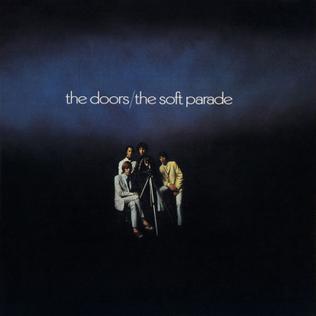With an opening blast of brass not so much Stax as the type of thing used by the Monkees or Gary Puckett & The Union Gap, “Tell All The People” puts Jim Morrison in the role of a benevolent prophet, leading the loving multitudes to a better world, which sounds less convincing than it reads. “Touch Me” is the song everybody knows, a single released a few months before the album was completed. We daresay the pop approach works here, despite the bad grammar, maybe because the sax solo is dirty enough to balance out. (It’s also featured in a clip from the Smothers Brothers show aired countless times since then, featuring Jim blowing his cue but recovering, Ray Manzarek “conducting” the horns and strings, and Robbie Kreiger’s glorious black eye.) On “Shaman’s Blues” the band finally sounds like themselves, a rolling waltz with all the classic elements of the previous albums. But then there’s the curious pair of underdeveloped tracks that finish the side. “Do It” begs us to listen to the children and please him all night, and “Easy Ride” can’t decide if it’s poetry or blues.
“Wild Child” gets things back on track with another tribal-based piece, though it ends awfully abruptly. “Running Blue” is a mess; a promising intro chant turns into another horn-heavy verse before a square dance chorus “sung” by Robbie. If this is what inspired Blood, Sweat & Tears, then the blame can be squarely placed. “Wishful Sinful” is a vast improvement, meshing melody, a chamber-pop arrangement and a convincing vocal, but it’s not until the long title track that we get an “epic” along the lines of “The End” or “When The Music’s Over”. Jim first takes on the role of a preacher, asks for sanctuary over classical keyboards, goes to a go-go for a psychedelic parody, skips through a nursery, and finally arrives at the best part of the trip. The main body of the track is both a tight jam and the good kind of jazz, and Jim’s layered vocals are very precise. Though we can’t figure out why anybody would want to whip a horse’s eyes.
As unfocused as The Soft Parade is, those pieces fit together to keep it from being an embarrassment. (We can’t say the same for the gatefold portrait, unfortunately.) The album’s 40th Anniversary Edition gives even more examples of their confusion, in the plodding B-side “Who Scared You”, two versions of “Whisky, Mystics And Men” (both using what sounds like an accordion) and the interminable “Push Push” jam, which is essentially a ripoff of a song by Joe Cuba, “the father of Latin boogaloo”.
The inevitable 50th Anniversary Deluxe Edition presented a remastered version of the album with “Who Scared You” tacked on at the end. The survivors took the bold move of presenting it on its own disc in a “Doors only” mix, with none of the strings or horns. Three tracks include parts recorded by Robbie in this century, but thankfully those are in addition to the stripped-down versions, and not instead. Folks who think Ray Manzarek was a woefully unappreciated blues belter (yes, we know, you can put those hands down now) will likely drool over his takes on “Roadhouse Blues”, “You Need Meat”, and “I’m Your Doctor”, all featuring new parts from the bass player in Stone Temple Pilots. Along with stabs at the “Seminary School” intro for the title track and the “I Am Troubled” prelude added to the 2007 mix, over an hour of the third disc is devoted to the oft-bootlegged epic ramble “Rock Is Dead”, wherein Jim teeters between self-parody and blues clichés while the band jams on the same, with the occasional sound of a Mellotron to add gravitas. There are a few repeated motifs that might have led to something more developed, but here it’s mostly tedious.
The Doors The Soft Parade (1969)—3
2007 40th Anniversary Edition: same as 1969, plus 6 extra tracks
2019 50th Anniversary Deluxe Edition: same as 1969, plus 16 extra tracks

No comments:
Post a Comment